|
|
|
Sort Order |
|
|
|
Items / Page
|
|
|
|
|
|
|
| Srl | Item |
| 1 |
ID:
137606
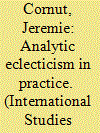

|
|
|
|
|
| Summary/Abstract |
The relation of different theoretical approaches to one another is a disquieting question in International Relations (IR). Building on recent scholarship addressing the logic of questions and the analytical tools the scholarship provides for investigating the contributions of different explanations this piece argues that any and all explanations are an answer to a contrastive why-question. First, the article presents the objections to eclecticism. It then reviews the application of the logic of questions to IR and develops a “contrast theory” clarifying this logic: Seeking an explanation means delimiting a contrast space within a specific interrogatory context. The article lastly shows how these concepts help in thinking about post-foundational science of IR, that is, a science with no universal epistemological foundation to knowledge. I argue that the pragmatic, problem-driven and complexity-sensitive research agendas are a stronger foundation than currently predominant conceptualizations. An example, drawn from Iran's attempts to acquire nuclear weapons, helps illustrate the value-added by a logic of questions approach
|
|
|
|
|
|
|
|
|
|
|
|
|
|
|
|
| 2 |
ID:
097625
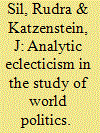

|
|
|
|
|
| Publication |
2010.
|
| Summary/Abstract |
This article defines, operationalizes, and illustrates the value of analytic eclecticism in the social sciences, with a focus on the fields of comparative politics and international relations. Analytic eclecticism is not an alternative model of research or a means to displace or subsume existing modes of scholarship. It is an intellectual stance that supports efforts to complement, engage, and selectively utilize theoretical constructs embedded in contending research traditions to build complex arguments that bear on substantive problems of interest to both scholars and practitioners. Eclectic scholarship is marked by three general features. First, it is consistent with an ethos of pragmatism in seeking engagement with the world of policy and practice, downplaying unresolvable metaphysical divides and presumptions of incommensurability and encouraging a conception of inquiry marked by practical engagement, inclusive dialogue, and a spirit of fallibilism. Second, it formulates problems that are wider in scope than the more narrowly delimited problems posed by adherents of research traditions; as such, eclectic inquiry takes on problems that more closely approximate the messiness and complexity of concrete dilemmas facing "real world" actors. Third, in exploring these problems, eclectic approaches offer complex causal stories that extricate, translate, and selectively recombine analytic components-most notably, causal mechanisms-from explanatory theories, models, and narratives embedded in competing research traditions. The article includes a brief sampling of studies that illustrate the combinatorial potential of analytic eclecticism as an intellectual exercise as well as its value in enhancing the possibilities of fruitful dialogue and pragmatic engagement within and beyond the academe.
|
|
|
|
|
|
|
|
|
|
|
|
|
|
|
|
| 3 |
ID:
172127
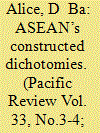

|
|
|
|
|
| Summary/Abstract |
How best to assess ASEAN as a collective enterprise are longstanding. Producing often polar assessments of the organization and its activities, the question has been a recurrent one in the scholarship on ASEAN and any retrospective on the organization. Stubbs’ (2019) article does not resolve the question, but it does offer ways to make sense of the debate. It also identifies ways forward with its identification of analytic criteria by which ASEAN’s performance as an international organization has been assessed. How well his two-camp categorization of the literature captures the state of play, however, can be debated. It is also not without potential costs.
|
|
|
|
|
|
|
|
|
|
|
|
|
|
|
|
| 4 |
ID:
097922
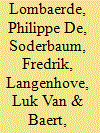

|
|
|
|
|
| Publication |
2010.
|
| Summary/Abstract |
There is virtually no systematic debate on the fundamentals of comparative research in the study of international regionalism. The field of research is very fragmented and there is a lack of interaction between EU studies and regionalism in the rest of the world. There is also a lack of communication between scholars from various theoretical standpoints and research traditions. Related to these two divides is the tension between idiographic and nomothetic methodologies. The purpose of this article is to contribute to the largely neglected debate on how to conduct and address three interrelated problems: a conceptual, a theoretical and a methodological one. Our claim is that the future of comparative regionalism should be one where old divides are bridged. This requires a combination of conceptual rigor, theoretical eclecticism, and sounder empirical research methods.
|
|
|
|
|
|
|
|
|
|
|
|
|
|
|
|
| 5 |
ID:
186122
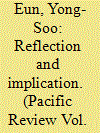

|
|
|
|
|
| Summary/Abstract |
This article elaborates on the following two questions and their implications. First, how can we as analysts offer compelling explanations for weak states’ agency and behaviours in the current global political and economic environments marked by multiplicity and fluidity? Second, what are the major causal factors that enable or influence weak actors’ agency, and under what conditions is their agency facilitated or constrained? Although an extensive literature in the discipline of International Relations (IR) confirms that today’s world is highly complex and diverse in terms of who or what matters in global politics, the subject of weak states and their agency is still not adequately discussed. Furthermore, the issues of methodology and theorising for the subject remain uncharted territory. By reflecting upon the main arguments and empirical findings of our special issue, this concluding article makes a case for ‘open-ended’ analytic eclecticism as an alternative methodological/analytical scheme, and lays preliminary ground for theorising weak states’ agency in the changed and changing global environments in the twenty-first century.
|
|
|
|
|
|
|
|
|
|
|
|
|
|
|
|
| 6 |
ID:
162504
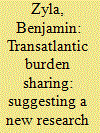

|
|
|
|
|
| Summary/Abstract |
Current studies on NATO burden sharing are only able to show some weak statistical trends between selective variables; they are unable to explain and show why this trend exists and why it occurred at particular times (or not). This is due to the dominant deductive and hypothesis testing research designs that prevent researchers to produce richer causal explanations or intersubjective understandings of how states, for example, construct and assign meaning to burdens or what forms of social representation, values, norms and ideals influence the making of (national) burden sharing decisions. Thus, we charge, the literature needs to adopt an eclecticist approach to studying NATO burden sharing – that is to combine rationalist with sociological approaches and methodologies highlighting the importance of intersubjective meanings and the role of social forces, norms, beliefs, and values. The article lays out what such a research programme might look like and how one could operationalise it.
|
|
|
|
|
|
|
|
|
|
|
|
|
|
|
|
|
|
|
|
|